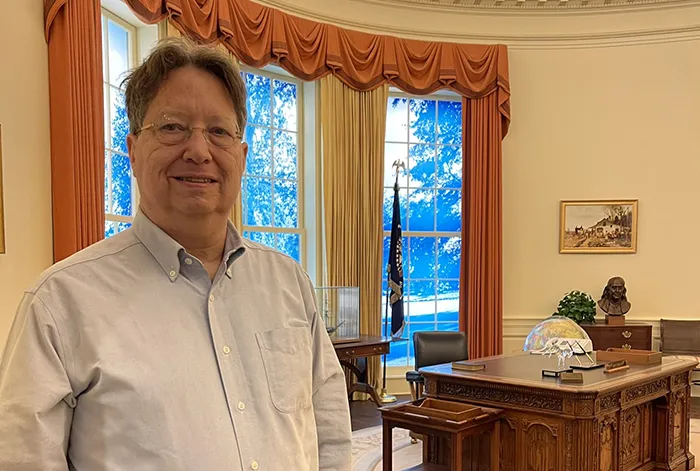By the Book: Roderick Wolfson
AIA LEED AP, Senior Planner / Project Manager, Sustainable Capital Planning and Project Management, Facilities Administration

Roderick at the Jimmy Carter Library and Museum's replica of the Oval Office
Roderick Wolfson is an architect who works as a senior planner/project manager in the College's Facilities Management office, on the Sustainable Capital Planning and Project Management team. He has been collaborating with the Libraries since 2018 on projects that include the Library Master Plan which is starting this fall and the Lib Lab, which opened in 2020. Also in 2018, he started leading the College's planning to renovate the Martin Biological Laboratory; which is now in construction and will open in the summer of 2025.
What are you reading these days? I tend to have three books going simultaneously - a fiction book for after work, an audiobook for my 45 minute commute to Swarthmore, and a non-fiction book when I have more concentration. I enjoy Victorian and early 20th century novels as the language (including metaphors) are so beautiful. I recommend Sinclair Lewis's Main Street that I'm in the middle of now. Lewis has wonderful descriptive lists in which the items chosen and the adjectives are brilliantly evocative of the point he's making.
In non-fiction I'm reading and recommend Safe Enough Spaces - A Pragmatist's Approach to Inclusion, Free Speech, and Political Correctness on College Campuses by Michael Roth (the President of Wesleyan University)
Describe your favorite place to read on campus: I envy all of the choices that students have of places to read on campus. As a staff member, my work reading all happens at my desk in the Facilities' Service Building and my pleasure reading happens at home.
Is there a book you've read multiple times? I'm not a person who re-reads books. Once I know a book's plot for fiction and the central argument in non-fiction, I don't have the patience to re-read it. I tried to re-read Middlemarch recently, because so many people say they reread it frequently. Knowing what a train-wreck Dorothea's marriage is, I couldn't stand to go through that again.
Who is your favorite author? My favorite author is Thomas Hardy. I just love his pantheistic descriptions of English country-side, his strong female protagonists, and the humane depictions of working class people who are disregarded by many of his contemporaries.
What's the latest book you could not finish even though you thought you should? I have tried to read numerous Bronte Sister novels and have given up. The only exception was I finished and enjoyed Jane Eyre. The poor treatment of people in Wuthering Heights and others didn't engage me.
What literary character would you most like to be friends with? Agnes Lee is an elderly writer from an old Quaker Philadelphia family in the novel Fellowship Point. The plot involves her trying to return Fellowship Point (where her family has a vacation house) back to nature. I like that she is committed to doing the right thing against social conventions.
Do you have a literary nemesis? Howard Roark, the architect depicted in Ayn Rand's The Fountainhead. This character propagates the idea of the ego-centric architect. I've tried to be the opposite - an architect who improves the built environment to increase peoples' well-being.
What is your favorite reading genre? Victorian and Edwardian Fiction.
What book do you recommend most often? The Power Broker, Robert Moses and the Fall of New York by Robert Caro - This biography is dauntingly long. However, it is a foundational work from which I learned so much about power structures, city planning, and New York City. I bought the 60 hour audiobook which engaged me for quite a number of commutes to and from Swarthmore; although sometimes I would arrive so angry at how the public interest was abused.
What's the best movie adaptation of a book you're read? The French Lieutenant's Woman - Meryl Streep and Jeremy Irons plus the amazing rural England scenery added greatly to the John Fowles' novel.
What author would you like to meet and what would you ask them? Clint Smith, the author of How the Word Is Passed: A Reckoning With the History of Slavery Across America. I'd like to talk with him about his book's method of documenting how historic places are interpreted today and how different people experience them. I'd be interested to discuss how his line of inquiry can be expanded from historic spaces to other spaces, such as the shared spaces at Swarthmore. How might some individuals experience those spaces differently than the common experience - for example the amphitheater, Parrish Hall parlors, or the McCabe Library?
What book made an early impact on you and why? The Universal Baseball Association, Inc., J. Henry Waugh, Prop. by Robert Coover is the story of an accountant who makes up a complicated baseball simulation game (on paper, pre-computers). That was me as a teenager.
What is one lesson you've learned from a book that you think everyone should know? Be compassionate, one can't know from outward appearances what's going on in another person's life or mind.
How does being a reader support your role managing the upcoming library master plan process? I'm an enthusiastic patron of the McCabe Library! I've browsed the library's fiction and non-fiction book shelves. I've searched for books and articles online through Tripod. And I've gotten help from College librarians when I have had trouble finding a book or article I was seeking. I'm impressed at and grateful for the resources available to us in the Swarthmore community.



